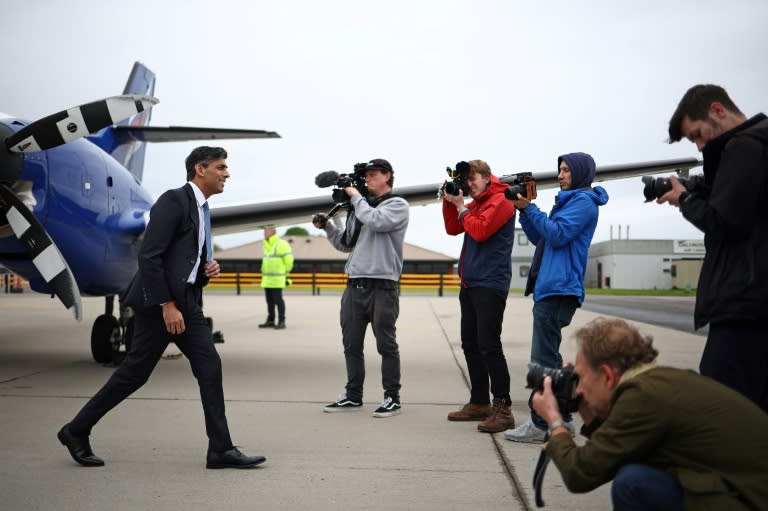UK parties hit campaign trail as election battle starts

UK political leaders kicked off six weeks of campaigning on Thursday, firing the first angry shots in their electoral battle before the country votes for a new government on July 4.
Conservative Prime Minister Rishi Sunak ended prolonged speculation about the general election in a rain-soaked speech Wednesday outside Downing Street, which some took as an omen for his Conservatives' chances at the ballot box.
UK commentators were virtually unanimous in describing his decision to hold a vote six months before he has to as a "gamble".
But Sunak hit the airwaves for a round of radio and television interviews Thursday, before a whistlestop tour of the country, and insisted insist he was right to call the vote.
"This is what Downing Street is thinking: things are basically not going to get any better for the prime minister," former finance minister George Osborne said on his Political Currency podcast.
"Nothing is shifting the polls," he added, calling the election a way to "shift the dial" and force the choice on the electorate.
- Tall order -
The Conservatives have been in power since 2010, first with David Cameron as prime minister, then Theresa May, Boris Johnson and Liz Truss, and increasingly beset by scandal and ideological infighting with hardliners.
The right-wingers' tumultuous time in power has been dominated by Brexit and its chaotic aftermath, as well as Covid and a cost-of-living crisis -- all of which has eaten into public support.
The gap between them and the main opposition Labour party over the last two years has opened to a likely insurmountable 20 percentage points.
"As of now, it looks as if there will be a change of government on July 4," Tony Travers, from the department of government at the London School of Economics, told AFP.
A snap Survation poll of voting intentions after Sunak's announcement put centre-left Labour on 48 points -- its highest since November 2022 and 21 points ahead of the Tories, on 27.
Survation said the results were consistent with Labour's polling throughout 2023 and this year. Other surveys have suggested similar results.
Anti-immigration fringe party Reform UK is snapping on the heels of the Tories, polling at 11 percent with the potential to split the right-wing vote by fielding candidates in almost every constituency.
Brexit champion Nigel Farage announced he will not try to become an MP after seven previous unsuccessful attempts, promising instead to "do (his) bit" for Reform during the campaign.
- Change? -
The vote -- the first to be held in July since 1945, when Labour under Clement Attlee defeated Winston Churchill's Conservatives -- is Sunak's first national electoral test. He was appointed leader by his own MPs in October 2022.
The 44-year-old former financier is presenting himself as the safe choice in an increasingly dangerous world and trumpeting the Tories as the party of economic stability.
Inflation has slowed to 2.3 percent, figures showed on Wednesday, a three-year low after highs of more than 11 percent in 2022.
"I know there's more work to do... but we have undeniably made progress and stability has returned," Sunak told BBC television.
He repeated his mantra that Labour, trounced in the last vote in 2019, was an unknown quantity, and accused Starmer of ideological flip-flopping on policy to curry favour with voters.
But Starmer, who has dragged the party back to the centre since taking over from his hard-left predecessor Jeremy Corbyn four years ago, said voters had a clear choice.
"Two countries, two different futures. Decline and chaos continuing under the Tories or rebuilding our country under Labour," the 61-year-old former human rights lawyer said on a campaign stop.
Labour is also promising economic stability, saying the Tories' reputation for sound stewardship of the nation's finances had been stained by Truss's short-lived tenure.
Sunak replaced Truss after just 49 days, when her tax cut plans spooked financial markets, sinking the pound and increasing mortgage rates, piling fresh misery on households already hit by higher food and energy prices.
On immigration -- another key issue -- Sunak promised that the first of the government's controversial deportation flights of failed asylum seekers will take off for Rwanda, but only after the election.
Starmer has called it a "gimmick".
phz-pdh/jwp/rox


